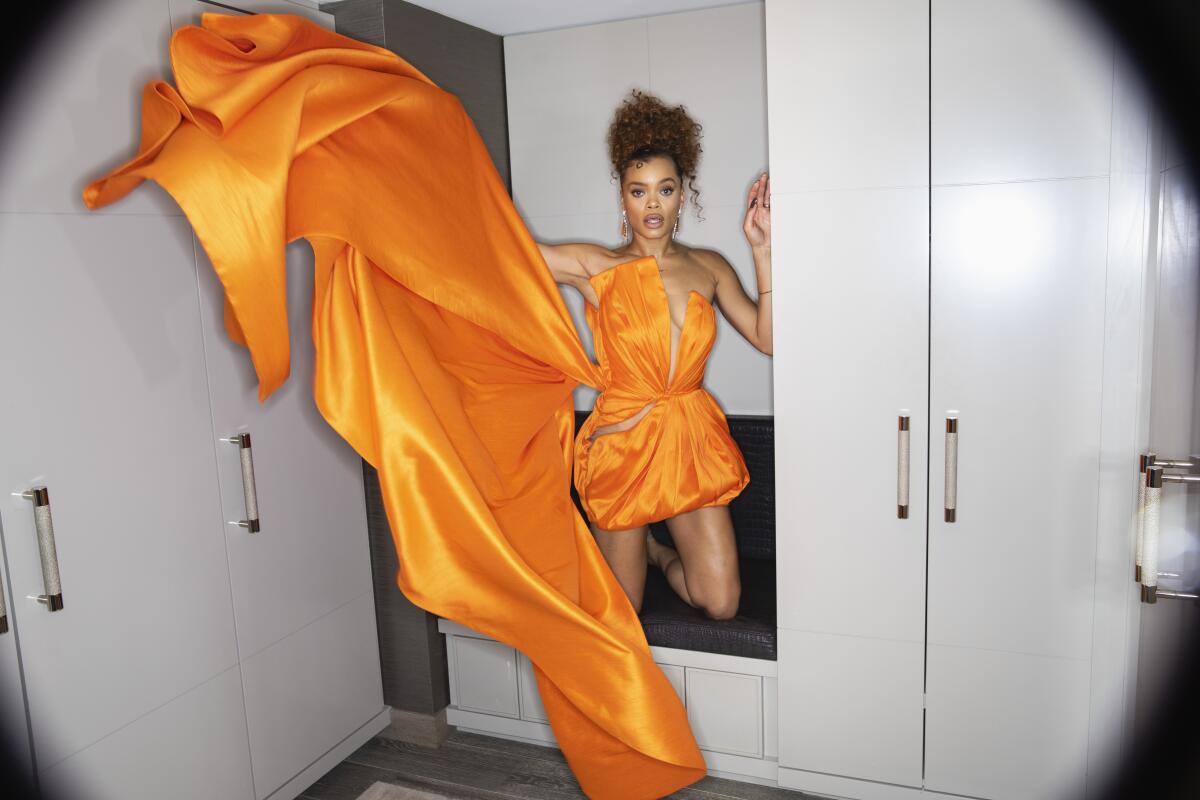Andra Day lands her first Oscar nomination for her film debut: ‘I just feel gratitude’

- Share via
Andra Day had been asleep on her couch when she woke up to the news that she was nominated for a lead actress Academy Award for her turn as the titular chanteuse in Lee Daniels’ “The United States vs. Billie Holiday.”
A powerhouse singer in her own right, Day makes her acting debut in the film, now streaming on Hulu. So to be nominated for an Oscar was shocking, to say the least.
“I was talking to someone the other day about how I think I deal with imposter syndrome where you feel like ‘Why am I here?’” said the 36-year-old via video call. “So it’s a little bit of that, but it is mostly just gratitude. As my amazing cast mate Da’Vine Joy Randolph puts it, ‘God is God,’ and that’s really what it is. I just feel gratitude for everyone involved and for this moment.”
Last month, Day made history as just the second Black woman to win a best actress in a drama prize at the Golden Globes. As she did when her Globes nomination came in, the first person she called this morning was Daniels. “He’s usually the first person I speak to when these things come through because he’s the first person I spoke to on set,” she said. “He made an incredible film and we did this journey together so I just called him to say thank you.”
Next she called her costars Trevante Rhodes, Tyler James Williams and Evan Ross; her management; publicity team and her family “just thanking everybody.”
“It’s funny because one of the things people would say to me all the time is ‘Oh don’t worry, you’ll never work this hard again because there’s not meaty roles like this for Black women,’” said Day. “And I just remember being floored by that comment. Like ‘Who the hell has meatier stories than Black women?’”
The musician and actress shares a category with Viola Davis (nominated for her performance in Netflix’s “Ma Rainey’s Black Bottom”) marking just the second time in Oscars history where two Black women will compete against each other for a lead actress prize.
“I don’t feel like I’m up against the great Viola Davis, [more like] we’re sharing the space,” said Day. “The reality is, this is a celebration. It’s an honor to be mentioned in the same breath as her. I think she’s just incredible, and she has been nothing but wonderfully supportive. And I love and support her so we’re just sharing the moment together.
“I also feel a little bit like, ‘Wow, let’s not let this much time go by before this happens again,” she added. “Because in my mind, there’s no reason [this isn’t more common]. Black women have done sensational work and the performances have been there throughout history. We always have to work so much harder. So I look forward to the day when it’s just normal to have whoever did the best work in those categories and [different cultures] are well represented.”
The last time two Black women competed for the best actress trophy was in 1973 when Cicely Tyson and Diana Ross were simultaneously nominated. Ironically enough, Ross was also up for a turn as Holiday in Sidney J. Furie’s biopic “Lady Sings the Blues.”
“Diana was just unreal in that movie,” said Day. “But we still didn’t fully know the truth [about Holiday being targeted by the FBI after that film]. She was really one of the great godmothers of the reinvigorated Civil Rights Movement, and she did that even in the midst of having an addiction. She was a very loving, nonjudgmental, higher thinking person at a time when people didn’t want her to be.”
This year, two films about iconic Black leaders who were targeted by the FBI have received Oscar nominations: “Judas and the Black Messiah,” which chronicles the assassination of Black Panther Party Chairman Fred Hampton at the hands of Chicago police, is up for five trophies, including best picture.
“Between Fred Hampton and [Holiday’s] story, COINTELPRO, the Tuskegee experiments, it’s a lot,” said Day. “It’s dark, what we’ve gone through.” She believes Holiday would be happy to see such stories finally brought to the light.
“I think she would be overjoyed because I don’t think she ever thought the world would truly know her story,” said Day. “I think she assumed that the lies and the respinning of her narrative would always be. But I think one thing she would tell us is, ‘Don’t stop at me, at Fred Hampton, at Bobby Seale, Assata Shakur, Angela Davis, Ota Benga.’ There are so many stories, and there’s been a real centuries-long effort to suppress our narratives and to limit the depth of our struggle, the scope of our contribution and the greatness of our triumph. People don’t want us to know how deep the struggle was or how much we contributed to their everyday lives.”
Six years after #OscarsSoWhite, this year’s awards feature Black performers represented in nearly acting category. But “we still have a ways to go,” says Day.
“Part of progress and moving forward is being seen. I think that this is hopefully the genesis and that we continue to be seen. And also that people understand that means we need the right eyes to see these projects who will get certain things right. Representation is key and that starts with [telling resonant stories]. I look forward to when it’s not a conversation of ‘This Black person did this,’ it’s just normal. Right now we’re living in an abnormality, and it’s one that’s making us sick. So we have to change that, otherwise we won’t survive.”
More to Read
Only good movies
Get the Indie Focus newsletter, Mark Olsen's weekly guide to the world of cinema.
You may occasionally receive promotional content from the Los Angeles Times.











